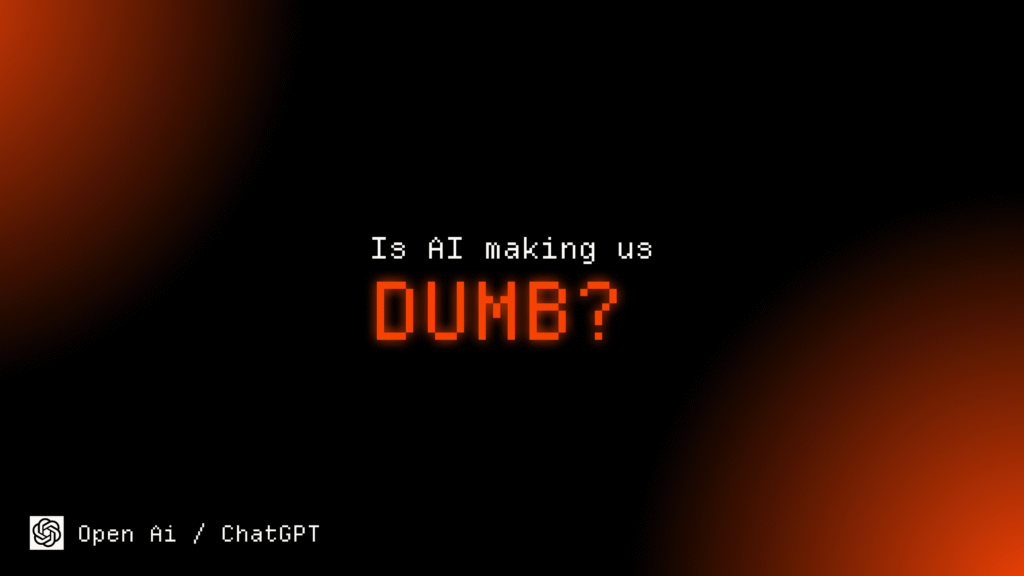Is AI making us dumb, or are we unknowingly trading mental agility for convenience? As algorithms craft essays, plan trips, and generate art, emerging evidence highlights a troubling trade-off: our brains, deprived of routine challenges, may be losing their edge in critical thinking and creativity. Studies show students relying on AI for writing exhibit a 30% drop in critical thinking scores, while neuroscientists warn of “cognitive atrophy” through over-reliance on AI. This article explores the science behind mental offloading, Robert Sternberg’s critique of AI’s “replicative” creativity, and why treating AI as a collaborator—not a crutch—could help harness its power without losing our intellectual independence.
Is AI making us dumb? The growing debate over our cognitive future
Every morning, millions of people wake up and immediately ask their smartphone’s assistant for the weather, navigate to work using GPS, and draft messages with auto-suggestions. This seamless integration of AI into daily life raises a critical question: Is AI making us dumb? As tools like generative AI become more sophisticated, critics warn of a potential erosion of cognitive skills, while optimists argue these technologies could redefine human intelligence.
The debate hinges on two competing ideas. On one side, cognitive offloading—the reliance on external tools to perform tasks once handled by the brain—could weaken mental muscles. Research by Michael Gerlich suggests frequent AI users, particularly younger individuals, show lower critical thinking scores, while Microsoft and Carnegie Mellon’s studies highlight reduced problem-solving autonomy. On the other side, proponents argue AI could act as a cognitive enhancer, amplifying creativity and analytical capabilities through collaboration, not replacement.
This article explores the evidence, from memory decline and creativity concerns to counterarguments about evolving intelligence. It also examines strategies for balanced AI use, ensuring technology complements rather than replaces human cognition. The goal isn’t to fear AI, but to harness it wisely.
The science of cognitive offloading: how AI takes over our mental heavy lifting
What is cognitive offloading?
Cognitive offloading describes delegating mental tasks—like memorization or problem-solving—to external tools. Think of it as outsourcing brainwork: calculators handle math, search engines store facts, and AI writes essays. Like muscles unused, underutilized cognitive skills risk weakening. Professor David Rafo noted students’ improved writing during the pandemic, attributing it to AI, not skill—raising concerns about learning loss.
Humans have always used tools to ease mental strain, but AI accelerates this by offering instant answers that bypass critical thinking. While tools like Google Maps reduce cognitive load, studies show they erode spatial memory. The brain adapts by conserving resources—a survival trait that may backfire in an AI-dependent world.
From convenience to cognitive atrophy
Intellectual atrophy isn’t inevitable, but it’s a risk. Dr. Anne McKee warns that mental passivity weakens neural pathways. Thorndike’s Law of Use and Disuse supports this: unused skills decay. Over-reliance on AI could mirror elevator reliance weakening leg muscles. A 2024 study showed 15% lower memory recall in employees overly dependent on digital tools—hinting at long-term risks.
Yet, cognitive offloading isn’t purely negative. It can boost productivity and creativity. The challenge lies in balance; like social media’s mix of connection and distraction, AI’s value depends on usage. Skeptics argue cognitive evolution, not decline, is underway. Calculators transformed math application without erasing understanding. The key lies in deliberate practice: using AI as a partner, not a crutch.
This tension defines the AI era. While tools reshape cognition, the brain’s adaptability offers hope. As Professor Toby Walsh notes, the “Reverse Flynn Effect” hints at declining reasoning among 18–22-year-olds, though causes remain debated. The question isn’t whether we’re “getting dumber,” but whether we’re steering—or surrendering—to the shift.
The Evidence: What Studies Say About AI’s Impact on Our Brains
Weakening Critical Thinking Skills
Research links frequent AI use to reduced critical thinking. A Swiss Business School study found a significant negative correlation between AI reliance and critical thinking scores, especially among younger users. Heavy AI users performed worse in problem-solving scenarios, showing reduced ability to identify inconsistencies or assess multiple perspectives.
A Microsoft and Carnegie Mellon study revealed knowledge workers using generative AI shifted from task execution to output verification. High trust in AI reduced cognitive effort, prioritizing speed over analysis. This “effort shift” threatens analytical reasoning in fields requiring nuanced evaluation, such as legal analysis or medical diagnostics.
Zhai, Wibowo, & Li’s 2023 review reinforces this. Over-reliance on AI in education led to weaker decision-making. Students accepted AI-generated answers without scrutiny, taking cognitive shortcuts. For example, AI-assisted essay writing reduced students’ ability to create original arguments or contextualize historical events. Neural activity in prefrontal cortex regions—linked to strategic thinking—also declined, mirroring patterns seen in cognitive debt studies.
- A significant negative correlation between frequent AI use and critical thinking skills
- A shift in cognitive effort from task execution to answer verification
- A systematic decrease in brain connectivity when using external AI support
- An erosion of analytical reasoning and decision-making abilities with over-dependence
The Risk of a ‘Cognitive Debt’ and Memory Loss
A MIT Media Lab study found reduced brain connectivity in users writing essays with language models (LLMs). Neural activity tied to creativity and deep processing weakened compared to non-AI users. This “cognitive debt” reflects lower ownership of work and poorer outcomes. Participants in AI groups struggled to recall their own writing, with educators describing outputs as “soulless.”
Cognitive debt extends beyond neural patterns. Repetitive AI use promoted mental laziness, as participants copied responses rather than think independently. This mirrors the “Google effect,” where search engine reliance diminishes retention, now amplified by AI’s capacity to generate comprehensive outputs with minimal input. The hippocampus—the brain’s memory hub—receives less stimulation when AI handles memorization tasks.
Memory risks emerge as AI handles memorization tasks. While tools like ChatGPT aid learning via quizzes, overuse weakens natural memory encoding. Students using AI for translation showed slower vocabulary growth compared to peers manually practicing conjugations, as manual effort stimulates the hippocampus more effectively. This trend suggests over-delegation of cognitive tasks may impair long-term memory formation.
The creativity paradox: generating more ideas, but less originality
Artificial intelligence excels at amplifying idea generation, yet this abundance creates a paradox. While individuals may produce more concepts using AI tools, the collective pool of ideas grows homogenized. This trend raises concerns about a “cognitive entropy” where innovation stagnates, as noted by psychologist Robert Sternberg, who critiques AI as “replicative” rather than truly paradigm-breaking.
Neuroscientific insights reveal another layer. The brain’s reward system activates more intensely during personal “aha moments” than when consuming AI-generated ideas. This distinction matters for learning and creativity, as the dopamine-driven satisfaction from self-discovery drives deeper cognitive engagement. Over-reliance on AI risks weakening these neural pathways through underuse.
Microsoft and Carnegie Mellon research highlights how AI can inhibit critical thinking. Users increasingly depend on AI for problem-solving, diminishing their ability to tackle challenges independently. This dependency manifests in writing, with AI-assisted content showing stylistic uniformity. A Medium analysis argues this phenomenon creates a “crutch for laziness,” where recycled ideas and formulaic outputs dominate.
Yet, the solution isn’t abandoning AI but redefining its role. Sternberg emphasizes preserving human creativity by actively challenging AI’s limitations. By using AI to refine rather than replace original thought, we can harness its efficiency while protecting the cognitive diversity essential for breakthrough innovations. The key lies in conscious collaboration that values human insight over algorithmic predictability.
From theory to reality: the tangible risks of blind trust in AI
When AI gets it wrong: misinformation and false arrests
Robert Williams’ wrongful arrest in Detroit reveals systemic flaws in AI deployment. A facial recognition algorithm misidentified him from low-resolution footage, leading to a 30-hour detention despite a confirmed alibi. This echoes Google’s AI Overviews, which falsely claimed Barack Obama was America’s first Muslim president and promoted dangerous advice like eating rocks for health benefits. Such errors demonstrate how unvetted AI outputs create real-world harm, from reputational damage to life-altering legal consequences.
Algorithmic bias intensifies risks for marginalized communities: NIST research shows facial recognition misidentifies Black individuals 100x more often than white users. In Williams’ case, the software ranked him ninth in likelihood, yet police prioritized its match over basic verification. Over 7 documented false arrests linked to AI misidentification—including Porcha Woodruff, arrested while 8-months pregnant—highlight gaping accountability gaps in algorithmic policing. These cases exemplify how automation bias turns technical errors into human tragedies.
The shift in cognitive effort: a side-by-side comparison
AI doesn’t erase intelligence but redistributes cognitive effort. Compare these transformations:
| Cognitive Task | Traditional Approach (Without AI) | AI-Assisted Approach |
|---|---|---|
| Writing a report | Research, structuring, drafting, editing (high cognitive load) | Prompt engineering, evaluating output, fact-checking, light editing (effort shifted to verification) |
| Planning a trip | Research destinations, compare flights/hotels, create itinerary (problem-solving) | Describe preferences to AI, review suggested itinerary (decision-making based on pre-filtered options) |
| Learning a new concept | Read multiple sources, synthesize information, self-explain (deep processing) | Ask for a summary, request analogies (surface-level processing) |
Overreliance fosters “cognitive laziness.” MIT studies found ChatGPT-4 users showed reduced neural activity and 83% couldn’t recall key essay details. Gerlich’s 2025 research linked frequent AI use to lower critical thinking scores, as users favor algorithmic shortcuts. However, strategic integration—delegating routine tasks while verifying outputs—can sustain cognitive resilience. For instance, students using AI for grammar checks (not content generation) maintained stronger analytical skills. This proves technology’s impact hinges on mindful implementation, balancing efficiency with intellectual engagement.
The Counter-Argument: Could AI Actually Make Us Smarter?
A Brief History Of Technological Panics
Concerns about technology eroding cognitive abilities are not new. In Plato’s Phaedrus, Socrates warned that writing would weaken memory, as people would rely on “external characters” instead of internal recall. Similar fears arose with the invention of calculators and GPS. Critics argued these tools would make us “worse at math” or “bad at navigation.” Yet, history shows these technologies freed mental resources for complex problem-solving. As just as calculators made us more efficient, AI could shift focus from routine tasks to higher-order thinking. These historical parallels suggest cognitive decline is not inevitable but depends on how we adapt.
From Artificial To Amplified Intelligence
H&M Group redefined AI as “amplified intelligence,” emphasizing collaboration between humans and machines. By combining data-driven insights with human intuition, this approach boosts productivity and creativity. A Nielsen Norman Group study found AI tools increased workplace productivity by 66%, with the greatest gains among less experienced workers. For example, customer service agents using AI resolved 35% more queries than before, while new employees reached expertise four times faster.
- Automating tedious tasks to free up mental resources for higher-level thinking
- Providing instant access to information, acting as a powerful research assistant
- Assisting in skill acquisition by offering personalized learning paths and explanations
- Augmenting human creativity by generating novel starting points for brainstorming
As explored in Wired, this symbiosis between human and machine learning reduces skill gaps while preserving autonomy. For instance, programmers using AI tools completed 126% more coding projects weekly, while AI-driven tutoring systems help students grasp complex concepts faster. These examples illustrate how AI can act as a “cognitive forklift,” amplifying rather than replacing human potential when applied thoughtfully. By focusing on augmentation rather than replacement, AI could democratize expertise and redefine productivity.
Navigating the AI era: how to use AI without losing your mind
Strategies for mindful AI integration
Adopting AI responsibly requires deliberate practices to preserve cognitive autonomy. Begin by engaging your own problem-solving skills before consulting AI tools. Formulate your approach to writing, analysis, or creative challenges first, then use AI to refine ideas rather than generate them wholesale.
- Think first, prompt later: Map out your goals and structure manually before using AI assistance.
- Act as the final editor: Always verify facts, critically evaluate outputs, and adjust language to maintain your unique voice.
- Use AI as a partner, not a replacement: Leverage AI for overcoming creative blocks, not as a substitute for intellectual effort.
- Cultivate deep curiosity: Ask AI follow-up questions to explore nuances rather than settling for superficial answers.
For instance, students using AI for research should first draft their own thesis statements before refining them with AI suggestions. This maintains analytical rigor while benefiting from technological efficiency.
The future of human-AI collaboration
Education systems must evolve to prepare future generations for AI coexistence. Early training in critical evaluation of AI outputs is essential – imagine classrooms where students analyze AI-generated arguments for logical fallacies or cultural biases.
Human strengths like emotional intelligence and ethical judgment remain irreplaceable. While AI handles data analysis, humans will focus on contextual interpretation. A 2025 OECD framework emphasizes teaching pupils to “co-create with AI” while nurturing creativity and moral reasoning.
Balance is key: use AI for routine tasks like grammar checks, but reserve complex problem-solving for human cognition. The goal isn’t to reject AI, but to harness it strategically – making us more capable collaborators rather than passive consumers of machine-generated content.
By cultivating these practices, we can prevent cognitive atrophy while embracing AI’s potential. The future belongs to those who master the delicate dance between technological assistance and human ingenuity.
Conclusion: A Tool in Our Hands, a Choice for Our Minds
Artificial intelligence presents a dual potential: it can either erode critical thinking through over-reliance or enhance cognition when used intentionally.
Research, including Microsoft-CMU studies, shows excessive AI dependence reduces problem-solving independence. Cognitive offloading—trusting AI for memory or analysis—can weaken foundational skills like language learning or data interpretation, akin to muscle atrophy from disuse.
Counterarguments emphasize cognitive evolution. By automating routine tasks, AI frees mental capacity for complex reasoning. For example, AI tutoring in STEM boosts procedural skills, while generative tools spark creativity. The key is intentional use: AI should complement, not replace, cognitive effort.
Answering “Is AI making us dumb?” depends on our choices. Education systems must teach critical AI engagement, balancing efficiency with mental rigor. Setting boundaries—like “AI-free” sessions—and verifying AI outputs ensure autonomy.
AI’s value lies not in the technology itself, but in our disciplined use of it. Human cognition’s future isn’t predetermined—it’s a collective decision. Will we let AI dull our minds, or use it to reach new intellectual heights? The choice remains ours.
AI’s dual impact: over-reliance risks cognitive decline, but mindful use boosts creativity and problem-solving. The answer to Is AI making us dumb? hinges on how we balance reliance with active engagement. Use AI as a collaborative tool, not a crutch, to amplify human strengths like critical thinking. Our future depends on conscious choices: will AI dull or sharpen our minds?
FAQ
What is cognitive offloading, and how does AI accelerate it?
Cognitive offloading refers to the practice of relying on external tools to handle mental tasks like memory, calculation, or decision-making. With AI, this process has intensified as tools like ChatGPT take over tasks that once required active thinking. Research from the MIT Media Lab shows that heavy reliance on AI for tasks like essay writing reduces brain connectivity, weakening neural pathways tied to critical skills. Think of it like muscle atrophy—if we don’t “exercise” our cognitive abilities, they may decline over time, much like physical muscles left unused.
Is there scientific evidence that AI harms critical thinking?
Yes. Studies indicate a correlation between frequent AI use and weakened critical thinking. For example, research by the Swiss Business School found younger users overly dependent on AI scored lower in critical thinking assessments. Similarly, Microsoft and Carnegie Mellon studies highlight a “shift in cognitive effort,” where users focus more on verifying AI-generated answers than on solving problems independently. This dependency risks eroding analytical reasoning and decision-making skills, particularly when users accept AI outputs without scrutiny.
Can AI actually boost creativity, or does it limit originality?
AI presents a paradox for creativity. While it can generate vast quantities of ideas quickly, these often lack diversity at a societal level. Psychologist Robert Sternberg argues AI is “replicative” rather than truly innovative, producing recycled concepts. Neuroscientific studies also suggest the brain’s reward system—activated by personal “aha moments”—is less engaged when ideas come from machines. However, AI can act as a brainstorming partner, offering novel starting points. The key is balancing AI assistance with intentional creative effort to avoid over-reliance on algorithmic suggestions.
Could AI make us smarter by complementing human intelligence?
Absolutely, but only if used strategically. Historically, tools like calculators and GPS initially sparked similar fears but ultimately freed mental resources for complex tasks. H&M’s concept of “amplified intelligence” exemplifies this: AI handles repetitive work, letting humans focus on creativity and decision-making. Studies show AI boosts productivity by 66% on average, particularly for complex tasks like coding. The challenge lies in maintaining critical engagement—using AI as a collaborator, not a crutch, to avoid cognitive complacency.
How can we use AI without harming our cognitive abilities?
Mindful AI integration is key. Start by thinking through problems before querying AI (“think first, prompt later”). Always fact-check and refine outputs to maintain editorial control. Use AI for ideation, not execution, and cultivate curiosity by asking deeper questions. Education systems must teach responsible AI use early, emphasizing skills machines can’t replicate: intuition, empathy, and nuanced critical thinking. The goal isn’t to avoid AI but to harness it in ways that enhance—rather than replace—our innate human capabilities.


